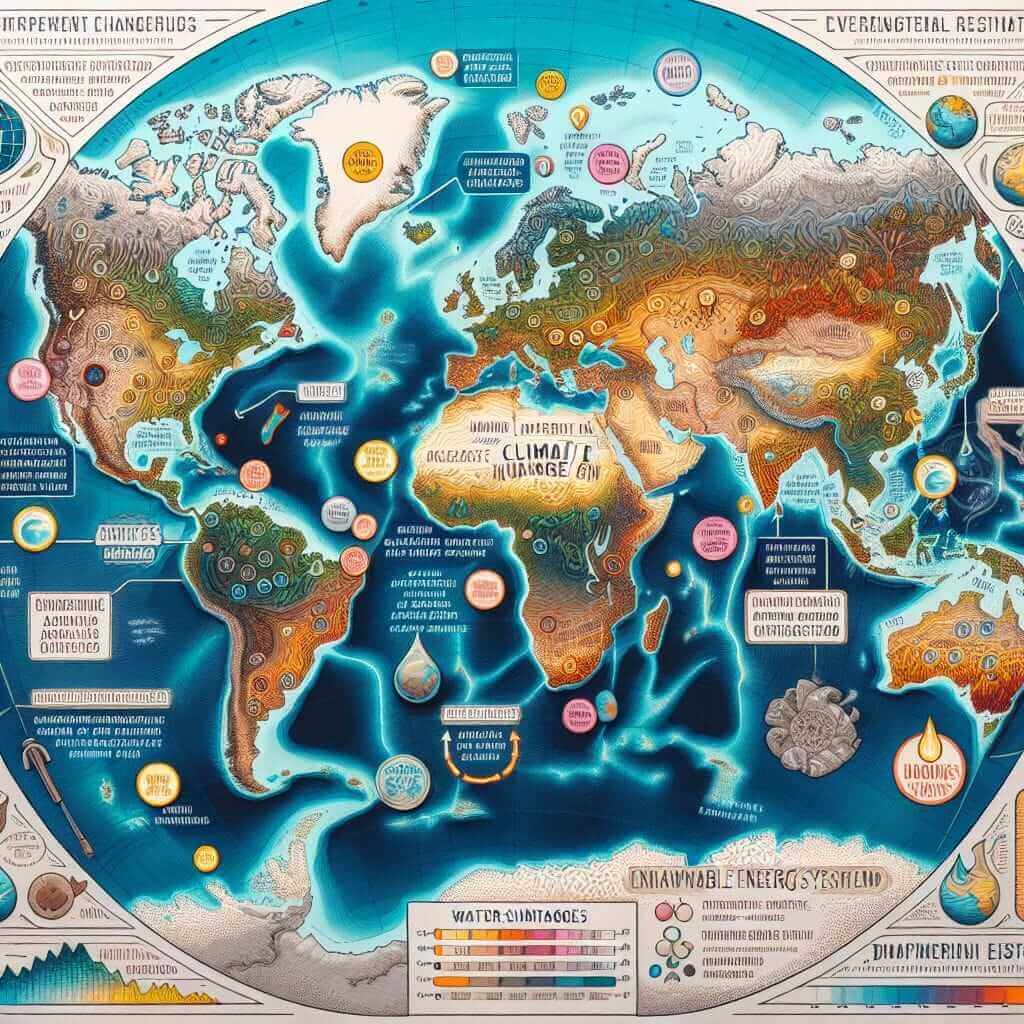The IELTS Reading section demands not only adept reading skills but also the ability to understand and analyze complex texts on various topics. One particularly timely and critical topic is the influence of climate change on global natural resources. This subject has gained prominence in recent years, making it a potential candidate for future IELTS Reading tests. Historical data and current trends suggest a high probability of encountering related questions, owing to the global significance and urgency of the issue.
Nội dung bài viết
Main Content
Reading Practice Test
Passage
Climate Change and Its Impact on Global Natural Resources
Climate change, driven primarily by human activities such as burning fossil fuels and deforestation, has far-reaching effects on global natural resources. The rising average temperatures and shifts in precipitation patterns are impacting water availability, agricultural productivity, forest ecosystems, and energy resources.
Water resources are particularly vulnerable to climate change. As temperatures rise, the hydrological cycle intensifies, leading to more severe droughts and floods. This alters the supply of freshwater and affects its availability for drinking, agriculture, and industry. Additionally, glaciers and snowpacks, which serve as critical water reservoirs, are diminishing at alarming rates.
Agricultural productivity is another area severely impacted by climate change. Extreme weather events, such as heatwaves and heavy rains, disrupt crop yields and lead to food insecurity. Certain regions face the dual challenge of rising temperatures and reduced rainfall, which can severely hinder their agricultural output.
Forest ecosystems are also experiencing significant changes due to climate change. Increased temperatures and altered precipitation patterns contribute to enhanced vulnerability to pests, diseases, and fires. These factors collectively threaten biodiversity and the health of forest ecosystems worldwide.
Energy resources are not immune to the effects of climate change. Hydropower, which relies on consistent water flow, faces challenges due to altered river flows and reduced water availability. Similarly, the efficiency of thermoelectric power plants, which require substantial water for cooling, is compromised during heatwaves and droughts.
To mitigate the adverse effects of climate change on natural resources, it is crucial to adopt sustainable practices and invest in renewable energy sources. Policymakers, industries, and individuals must collaborate to implement innovative solutions that preserve our planet’s natural resources for future generations.

Questions
Multiple Choice
-
According to the passage, which of the following is a consequence of climate change on water resources?
A. Decreased agricultural productivity
B. Severe droughts and floods
C. Enhanced biodiversity
D. Increased energy resources -
What dual challenges do certain agricultural regions face due to climate change?
A. Enhanced forest health and renewable energy
B. Increased renewable energy and water abundance
C. Rising temperatures and reduced rainfall
D. Food security and clean water supply -
How does climate change affect thermoelectric power plants?
A. Increased efficiency during heatwaves
B. Reduced efficiency due to cooling water shortages
C. Enhanced power output with higher temperatures
D. Unaffected by changes in water availability
True/False/Not Given
- Forest ecosystems are only impacted by increased temperatures due to climate change.
- Policymakers play a crucial role in mitigating the adverse effects of climate change on natural resources.
- Hydropower is unaffected by changes in river flows and water availability.
Answer Key
- B. Severe droughts and floods – The passage explains that rising temperatures intensify the hydrological cycle, leading to more severe droughts and floods.
- C. Rising temperatures and reduced rainfall – The passage mentions that certain regions face rising temperatures and reduced rainfall which can severely hinder their agricultural output.
- B. Reduced efficiency due to cooling water shortages – The passage discusses that thermoelectric power plants require substantial water for cooling, and their efficiency is compromised during heatwaves and droughts.
- False – The passage explains that forest ecosystems are impacted by increased temperatures, altered precipitation patterns, pests, diseases, and fires.
- True – The passage states that policymakers must collaborate to implement innovative solutions to preserve natural resources.
- Not Given – The passage mentions challenges faced by hydropower due to altered river flows and reduced water availability but does not state that hydropower is unaffected.
Common Mistakes
Students often struggle with understanding the interconnections between different impacts of climate change. For example, they might not fully grasp how changes in water resources can affect energy production and agricultural productivity. It’s essential to read carefully and understand the broader context.
Vocabulary
-
Hydrological (Adjective) /ˌhaɪdrəˈlɒdʒɪkəl/ – relating to the scientific study of the movement, distribution, and quality of water on Earth.
- E.g., Climate change has intensified the hydrological cycle, leading to severe weather patterns.
-
Scarcity (Noun) /ˈskeərsɪti/ – the state of being scarce or in short supply.
- E.g., The scarcity of water in drought-affected regions has reached critical levels.
-
Mitigate (Verb) /ˈmɪtɪɡeɪt/ – to make less severe, serious, or painful.
- E.g., Sustainable practices can help mitigate the effects of climate change on natural resources.
Grammar Focus
Relative Clauses – Used to provide additional information about a noun without starting a new sentence.
- Example: “Glaciers and snowpacks, which serve as critical water reservoirs, are diminishing at alarming rates.”
Passive Voice – Often used in scientific writing to emphasize the action rather than the subject.
- Example: “Water resources are particularly vulnerable to climate change.”
Tips for High IELTS Reading Scores
- Practice Regularly: Regular practice under exam conditions will improve your speed and accuracy.
- Develop Skimming and Scanning Skills: Learn to quickly identify key information in the text.
- Expand Your Vocabulary: A broad vocabulary allows for better comprehension of diverse topics.
- Understand Question Types: Familiarize yourself with different question formats to avoid surprises during the test.
- Take Notes: Jot down key ideas and details while reading to help answer questions more efficiently.
By understanding and practicing with a focus on current, relevant topics like climate change and its effects on global natural resources, you’ll enhance your chances of achieving a high score in the IELTS Reading section.